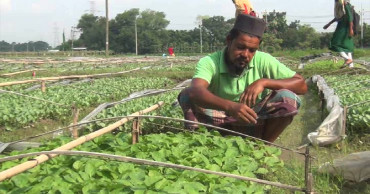vegetables
Beat Dehydration with These Summer Vegetables
As the temperatures soar during the scorching summer months, it becomes increasingly crucial to prioritise hydration. Dehydration occurs when the body loses more fluids than it takes in. Dehydration may lead your body to adverse effects ranging from fatigue and headaches to more severe complications like heatstroke. While it is common knowledge to increase water intake during hot weather, many overlook the hydrating potential of the summer vegetables.
Why Incorporate Summer Veggies into Your Diet
Maintaining adequate hydration levels is crucial for maintaining overall health and well-being. Water is essential for regulating body temperature, aiding digestion, transporting nutrients, and flushing out toxins. Dehydration can lead to a range of adverse effects, including fatigue, headaches, dizziness, and even more severe complications like heatstroke.
By staying adequately hydrated, you can enhance cognitive function, improve physical performance, and support organ function. Make it a priority to drink water regularly throughout the day to ensure optimal hydration and vitality, especially in the summer heat.
Read more: How to Protect Your Skin and Hair from Sun Damage
Summer veggies are rich in diverse vitamins and nutrients. Adding vegetables to regular meals can help you stay hydrated and healthy during the warmer months. Let’s take a look into some nutritious summer veggies to fight dehydration this summer.
Nutritious Summer Vegetables to Beat Dehydration
.
Cucumber
Cucumbers are hydrating vegetables packed with nutrients like vitamins A, B, and C, along with minerals such as potassium and magnesium. With a water content over 95%, they replenish lost fluids and electrolytes, aiding hydration.
Enjoy cucumbers sliced in salads, sandwiches, or refreshing cucumber mint smoothies for a hydrating boost. Incorporating cucumbers into your diet regularly can promote skin health, aid digestion, and support overall well-being. Aim for at least one or two cups of cucumber daily to reap its hydrating benefits.
Read more: Summer Safety Tips for Elderly to Avoid Heat-related Illnesses
Tomatoes
Tomatoes are hydrating vegetables boasting a water content of around 94%. Rich in vitamins A and C, along with antioxidants like lycopene, they support immune function and promote heart health. You may incorporate tomatoes into your diet to enjoy their hydrating benefits.
Try them tossed in salads or sandwiches, blended into soups, or roasted with herbs for a flavourful side dish. It is recommended to include 1 or 2 tomatoes in your meals regularly to hydrate your body and boost your health.
Bell Peppers
Bell peppers, with a water content of approximately 92%, are hydrating vegetables rich in vitamins A, C, and K, as well as antioxidants. They support immune function, promote healthy vision, and reduce inflammation. You can incorporate bell peppers into your meals to enjoy their hydrating benefits.
Read more: 7 Comforting Soups for Upset Stomach
Add them to stir-fries, salads, or stuffed pepper recipes for a colourful and nutritious dish. Experts suggest limiting having one bell pepper in a day in your diet to stay hydrated and nourished, especially during hot weather without causing bloating or gas.
Lettuce
Lettuce varieties like iceberg and romaine are primarily composed of water. It is a hydrating vegetable that provides essential nutrients like vitamins A, K, and C, as well as folate and iron. It supports healthy skin, boosts immunity, and aids digestion.
Try to include lettuce in your diet for hydration and nutrition. Use it as a base for salads, wraps, or sandwiches for a refreshing and low-calorie meal option. Enjoy lettuce regularly to stay hydrated and promote overall well-being, aiming for around or less than two cups of green leaf lettuce per day.
Read more: 5 Mouth-watering Mango Pickle Recipes to Cherish This Summer
Spinach
Spinach, packed with water, is a hydrating vegetable loaded with vitamins A, C, and K, along with iron, potassium and folate. It supports bone health, boosts immunity, and aids in blood clotting.
Add one handful of spinach daily into your diet for hydration and nutrition. Add it to salads, smoothies, or cooked dishes for a nutritious boost. These can help you to stay hydrated and reap its numerous health benefits.
1 year ago
Here’s why it’s so hard to buy vegetables in the UK
When European Union chief Ursula von der Leyen visited Britain last week, some joked on social media: Can you please bring us some tomatoes?
People in the U.K. have had to ration salad staples like tomatoes and cucumbers for the past two weeks amid a shortage of fresh vegetables. Shelves of fresh produce in many stores have been bare, and most major supermarkets have imposed limits on how many salad bags or bell peppers customers are allowed to buy.
Officials blame the problem on recent bad weather in Spain and North Africa, saying the shortages could persist for up to a month. But many people were quick to point out that other European countries don’t seem to be suffering the same challenges, leading some to wonder if it was a consequence of Britain’s divorce from the EU.
Britain’s government has rejected the suggestion that Brexit is to blame. But shoppers aren’t happy, and Environment Secretary Therese Coffey’s suggestion that consumers should “cherish” British produce and eat more turnips instead of imported food drew widespread mockery.
Experts say Brexit likely played a part in the food shortage, though a more complex set of factors — including climate change, the U.K.’s overreliance on imports during the winter, soaring energy costs and the competitive pricing strategies at British supermarkets — are more salient explanations.
A look at some of the factors contributing to what one European broadcaster has called Britain’s “vegetable fiasco”:
COLD WEATHER, HIGH ENERGY BILLS
Unusually cold temperatures in Spain and heavy rain and flooding in Morocco — two of the biggest tomato suppliers to the U.K. — have led to poor yields and are cited as the primary cause of the shortage.
In Spain, farmers blame recent freezing temperatures following record heat and dry conditions last year.
In the southern province of Almeria, which grows 40% of Spain’s fresh vegetable exports, the production levels of tomatoes, cucumbers and eggplants fell by over 20% during the first three weeks of February compared with the same period in 2022, according to FEPEX, an organization representing Spanish fruit and vegetable exporters. The group said the situation is improving.
Heat and drought in Europe last year also are affecting vegetable harvests in other countries, including Germany.
Separately, the Netherlands, another major tomato producer, has seen a drop in output because skyrocketing energy bills tied to Russia’s war in Ukraine meant many growers couldn’t justify the cost of turning on the LED lights in their greenhouses this winter.
Vegetable growers in the U.K. have reported that they, too, were forced to leave their greenhouses empty.
Richard Diplock, managing director at the Green House Growers based in southern England, said his energy costs are some six times higher compared with previous winters.
“We made the decision that we couldn’t afford to heat the greenhouses in December and January, and we’ve held back planting until February. Lots of tomato growers are in a similar position,” he said.
BLAMING BREXIT
The shortages in Britain — and contrasting pictures of full vegetable shelves in supermarkets in mainland Europe — led to a degree of Brexit schadenfreude in some EU news outlets.
Experts say extra bureaucracy and costs associated with Brexit have played a part, though they stress it’s not a main factor.
“One hypothesis for fewer exports to the U.K. is that if supply is constrained, why would you go to extra paperwork (to export to Britain)?” said Michael Winter, a professor of agricultural change at the University of Exeter. “If transaction costs are greater for exporting to one country compared to another, that’s going to dictate where you go.”
“Brexit has exaggerated the problem, without a doubt,” Winter added. “But I don’t want to overplay that. It’s more to do with climate change and lack of investment in our industry.”
SUPERMARKET PRICING
Farmers say another factor is how Britain’s biggest supermarkets have sought to stay competitive by keeping prices as low as possible even as food costs have spiked, a major driver of inflation that’s at the highest levels in decades.
In some EU countries, like Germany, there are no empty shelves, but the prices for fresh vegetables have shot up massively. British supermarkets are reluctant to pay more or charge customers so much, Diplock said.
“Being in the U.K., you know every week the price of a cucumber is 75p ($0.90) no matter what time of year it is,” Diplock said. “North African and Spanish producers will see a better return for supplying European supermarkets.”
“WHERE’S THE INVESTMENT?”
Even if energy costs hadn’t risen so much, British growers would not come close to making up for the shortfalls in imported produce, Diplock said.
During the winter, domestic U.K. production only accounts for 5% or less of tomatoes and cucumbers sold in British supermarkets.
The National Farmers’ Union has warned for months that overreliance on imported fresh produce leaves the U.K. vulnerable to unpredictable weather events and other external factors like the war in Ukraine.
Farmers also have complained about the lack of government investment in the sector and funding to help them cope with painfully high energy bills.
The government has spent billions to help consumers and businesses as European natural gas prices soared to record highs on Russia’s curtailed supplies.
“The bigger question is why have we, in this country, neglected horticulture,” Winter said. “This is a bit of a wake-up call.”
3 years ago
Bangladesh is the world’ third largest in growing veggies: Razzaque
Bangladesh is the world’s third largest grower of vegetables with an annual production of 19.7 million tons, Agriculture Minister Muhammad Abdur Razzaque said on Monday.
The minister said this after inaugurating the three-day National Vegetable Fair at city’s Krishibid Institution Bangladesh.
He said, “We are tirelessly working to boost production of safe and nutritious food in the country and as a result the vegetable production has increased seven fold in the last 12 years.”
The minister said in a seminar held later, “There is a concern over price hike of vegetables ahead of the month of Ramadan but I can assure that prices will not go up this year unless any natural disaster occurs.”
READ: Stop trade based money laundering, Agriculture Minister urges customs officials
Replying to a question Razzaque said there are some complications regarding the distribution of the vegetables due to transportation, extortion, intermediary issues.
“If we can solve these issues, a fair price of vegetables will be ensured. Law enforcing forces, the ministry of commerce all will have to work together to keep the prices within buying capability of the masses," said Razzaque.
READ: Onion price will cool down within 15-20 days: Agriculture Minister
The minister said Bangladesh has huge possibilities in vegetable export and soon it will become one of the main sources of earning foreign exchange.
4 years ago
Veggies’ price soars due to untimely rains & intermediaries: Agriculture secy
The prices of vegetables has soared in the market because of intermediaries and untimely rains, said Agriculture Secretary Md Saidul Islam on Sunday.
He said that the prices of vegetables go up from time to time due to different circumstances.
“I have taken an action by connecting the district administration and the agriculture marketing department. After conducting research, we will know the exact reasons,” he told a press conference at the Secretariat.
The official said the agriculture ministry is working on the vegetable prices. “We are also doing a study on why vegetable prices are rising.”
“However, the information we have been getting so far is that the main reason for the rise in prices is always the intermediaries. We buy the vegetables at Tk 60-70 per kg here which cost around Tk 10-20 in Palashbari of Gaibandha,” he added.
Read: Rising food prices despite record stocks defies analysis
Secondly, there have been two unseasonal rains this year, specifically the December rain, which caused great damage to the vegetables, the secretary said.
The secretary said vegetable cultivation had been hampered by cyclone ‘Jawad’ in December this year.
“For this, we have taken an action by connecting the district administration and the agriculture marketing department to identify the intermediaries and take some measures against them to keep the price of vegetables at a tolerable level,” he said.
However, there was no shortage of production. But the farmers had to cultivate vegetables for the second time which has cost those more.
He said, “Rising farming costs seem to be another reason for the rise in prices. Overall, we are conducting research on the whole subject.”
National Vegetable Fair starting from Monday
The three-day National Vegetable Fair 2022 will begin next Monday at the premises of Krishibid Institution Bangladesh (KIB) in Farmgate of the capital, said Saidul Islam.
Agriculture Minister Dr Muhammad Abdur Razzaque will inaugurate the fair.
The fair, which is being held for the 6th time organized by the agriculture ministry, will continue till March 2 from 10 am to 8 pm.
There will be 52 government and non-government organizations’ stalls in the fair.
Read: Consumer rights directorate to launch drive in March to control commodity prices
The secretary said that the theme of this year is 'Safe Vegetable Cultivation, Health-Nutrition for Twelve Months'.
The fifth fair was organized in January 2020 where vegetables worth Tk 3 lakh were sold.
The agriculture secretary said vegetable cultivation has increased almost seven times in the last 12 years.
According to the United Nations’ Food and Agriculture Organization (FAO), Bangladesh is now the third largest producer of vegetables in the world. China and India have occupied the first two spots of the list respectively.
Around 13.29 per cent of GDP comes from agriculture sector. The country now cultivates 100 species of vegetables.
According to the Department of Agricultural Extension, in FY2020-21, 1,97,18,000 tonnes of vegetables were cultivated in 9,35,000 hectares of land.
In the previous year, 1,84,47,000 tonnes of vegetables were cultivated in nine lakh hectares of land, said the secretary.
4 years ago
Soaring prices of key items in Dhaka turn up heat in the kitchen
The overheated kitchen markets in Dhaka left the middle class and marginal income groups of people gasping even in the winter season. “We’re now in the middle of winter. The prices of key vegetables should have gone down by the time, but the prices are on fire,” said Shamim Gowher, a businessman. After visiting various kitchen markets, the UNB Correspondent found that the retailers were selling popular vegetables at Tk 50 to Tk 90 per kg claiming that there was a short supply in major wholesale markets. But the wholesalers claimed that the retailers are charging higher prices for vegetables for no reason. According to his market investigation, the price of broiler chicken has shot up to Tk 200 a kg, pinching the pockets of commoners already battered by the surging prices of other essentials like rice, edible oil, sugar and pulses. Visiting some wholesale kitchen markets, the correspondent observed that the winter vegetables are selling at 20 percent to 30 percent higher prices based on quality this year compared to that of the previous year. The price variation of vegetables also is based on areas like Gulshan, Banani and Hatirpool. The prices of vegetables at Karwan Bazar, Mohammadpur Krishi Market, Mirpur, Khilgaon, Fakirapool and Motijheel are almost similar.
Read:Spectre of panic buying returns to kitchen markets ahead of lockdown
4 years ago
Top 10 Nutritious Winter Vegetables in Bangladesh
In the winter, our bodies seek rich foods that provide both warmth and nourishment. This need necessitates the consumption of warming foods. Any vegetable that takes a long time to mature and has an edible section that grows beneath the ground's surface is usually warming and a wonderful winter vegetable to eat. When it comes to eating holistically for our health, seasonal foods provide a natural diversity that we should take advantage of. Now that it is winter, let us take a look at 10 of the most nutritious winter vegetables that provide numerous health benefits.
Winter Vegetables in Bangladesh
Carrots
The carrot is a root vegetable that is crunchy, delicious, and packed with nutrients. Beta carotene, fiber, vitamin K1, potassium, and antioxidants are the nutrients that are found in carrots. They are a healthy weight-loss snack that has been linked to decreasing cholesterol and bettering eye health. Their antioxidant carotene has also been associated with a lower incidence of cancer. Carrots might trigger allergy reactions in persons who are allergic to pollen. Carrots cultivated in contaminated soils may also have greater levels of heavy metals, compromising their safety and quality. To reap the benefits of numerous fruits and vegetables, including carrots, it must be consumed in moderation to avoid any negative consequences. Bangladeshis typically enjoy carrots raw, as sautéed or as the popular dessert known as gajor er halwa.
Read Winter Cake Ideas: Yummy Recipes to add your baking bucket list
Cabbage
To enhance the diet, start with cruciferous vegetables like cabbage. These are rich in vitamins, fibers and antioxidants. Consumption of cabbage may reduce the risk of certain diseases like heart diseases, high blood pressure, and high cholesterol level, improve digestion and reduce inflammation.
4 years ago
How to sanitise fruits & veggies: Safety tips during the pandemic
Pandemic or not, rinsing fruits and vegetables with water before eating them has always been an important habit -- as it helps remove many harmful bacteria, including salmonella, from the surface of the farm produce.
Covid-19 has only reinforced the need for washing fruits and vegetables under a running tap before consuming them. Not adhering to the practice could turn out to be a recipe for disaster -- food poisoning.
Salmonella, for instance, causes salmonellosis that can lead to an upset stomach, fever and cramps in the belly. Children, pregnant women, and the aged are the most vulnerable. And if the infection gets into your blood, it can lead to serious complications.
How to sanitise the fresh farm produce at home
First step
Wash your hands with soap and warm water for at least 20 seconds before and after handling eggs, raw meat, and seafood.
Then wash fruits and vegetables under a running tap and rub them properly. Otherwise, germs on their surface can get inside while peeling them. Don’t wash the farm produce with soap or detergents.
Also wash utensils, the cutting board, dishes and the kitchen top with hot water and liquid soap after preparing each dish and before embarking on the next one.
Make it a point not to wash raw meat and eggs just before cooking. Otherwise, germs on them can spread to other food items, utensils, and kitchen surfaces.
Read: How to identify adulterated milk at home
Second step
Wash raw meat, seafood, and eggs separately soon after bringing them home. You should wash them in the kitchen sink again but before disinfecting the utensils and the kitchen top.
You should keep the unused eggs in the original carton and inside the refrigerator.
Meanwhile, the cracked eggs should be discarded.
Final step
Using a food thermometer is the best way to ensure that foods are cooked to the right temperature.
Fix the temperature at 63°C for beef, mutton, and fish. Eggs are needed to cook until both the yolk and white become firm. Don’t put cooked food on a plate that has already been used once for keeping raw meat, seafood, or eggs.
Read: Kick-start your day with a healthy breakfast
How to sanitize your kitchen after cooking
Undoubtedly, the kitchen top is the most vulnerable area in the kitchen. It's used most of the time daily -- be it for preparing food or unpacking groceries. So, it is necessary to keep them clean all the time.
Pay attention to the leftovers
Bacteria generally tends to grow in tiny pieces of food lingering on your kitchen top. Wiping the spillover food by disinfecting your kitchen top will prevent the food residue and bacteria from building up over time accordingly.
Read: Intermittent Fasting: Health Benefits and Risks
Keep your sponge clean first
Your sponges and dishcloths harbor billions of bacteria. So you must disinfect them in a bleach solution so that you can reuse them.
Alternatively, you can wash your sponge and warm it in the microwave for 2.5 minutes. You can wash your dishcloths in the washing machine.
Keep your kitchen top dry
Salmonella spreads in a moist environment. So whatever the process you use to disinfect your kitchen top, make sure to completely dry them afterward. It can be as simple as wiping down the surface areas such as around the sink where the place is wet due to accumulating condensation.
To sum up, always disinfect the fruits and vegetables that you bring home.
Read:IKIGAI: The Japanese Secret to a Long Healthy life
4 years ago
Railway launches luggage van to transport vegetables
In a major boost for farmers amid the Covid-induced lockdown, Bangladesh Railway has launched a special luggage van service for transporting fruits and vegetables on the Dhaka-Panchagarh route.
Deputy Commissioner of Panchagarh, Dr Sabina Yeasmin inaugurated the train service at Panchagarh Rail Station on Monday.
Some three metric tonnes of different vegetables, including cucumber, tomato and eggplant, were transported by the wagon on the first trip.
Also read: Bangladesh Railway starts transporting sacrificial animals
Railway Lalmonirhat Divisional Manager Shah Sufi Nur Mohammad, said, "The government has taken the initiative to facilitate the farmers and traders to transport their goods easily from one district to another district. Already Bangladesh Railway operates a special train for carrying mangoes and a cattle train."
"Apart from carrying passengers, the Railway also transports oil, fertilisers and other goods. There are four wagons in the special train, each having a capacity of carrying 40 metric tonnes of vegetables.”
According to railway sources, vegetables can be transported to Dhaka by the train three days a week -- Saturdays, Mondays and Wednesdays.
Read Dhaka-Cox’s Bazar train service expected to augment tourism prospects
On this train, traders will also enjoy a 25 percent discount on the existing fee on carrying vegetables, fruits and other agricultural items while other charges will be abolished.
Panchagarh Railway Station Master Masud Pervez, said, “Traders and farmers can board the train with their products from all stations on the route."
However, Rashidul Islam and Badruzzaman Babu, two traders of Panimach Pukuri in Sadar upazila, said, "We will have to calculate our gains before using the train for transporting goods."
Also read: For Cumilla residents, unmanned railway crossings become death traps
Superintendent of Panchagarh Police Mohammad Yusuf Ali, Zila Parishad Chairman Anwar Sadat, Railway Lalmonirhat Divisional Manager Shah Sufi Nur Mohammad, Sadar Upazila Nirbahi Officer Arif Hossain were present on the occasion.
Bangladesh Railway has decided to launch the luggage van to transport vegetables from different parts of the country, Railways Minister Md Nurul Islam Sujan said in April last year.
Read Passenger train services to remain suspended during lockdown: Minister
Already eight parcel trains are operating to transport agricultural products across the country.
Meanwhile, coronavirus claimed 112 more lives in 24 hours till Monday morning, taking the death toll in the country to 10,497.
Besides, 4,271 new cases were reported during the period, raising the number of confirmed cases in the country to 723,221.
Read NID not mandatory for train travels, buying tickets
4 years ago
Cumilla vegetable seedling producers ‘really in trouble’
The shortage of capital, coupled with the rising prices of various materials, have put the vegetable seedling producers of the district in a big trouble.
6 years ago
Vegetable farming without soil grows popular among city dwellers
Cumilla, Sept 1 (UNB) – Growing vegetables usually requires land and arduous labour. So, the Cumilla Agricultural Research Centre has introduced vegetable farming using only water.
6 years ago







.jpg)






